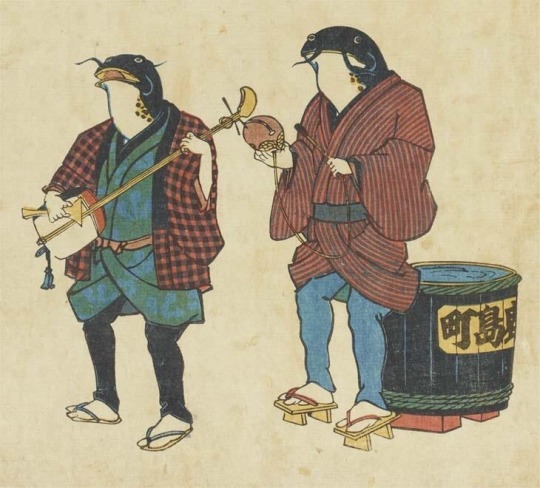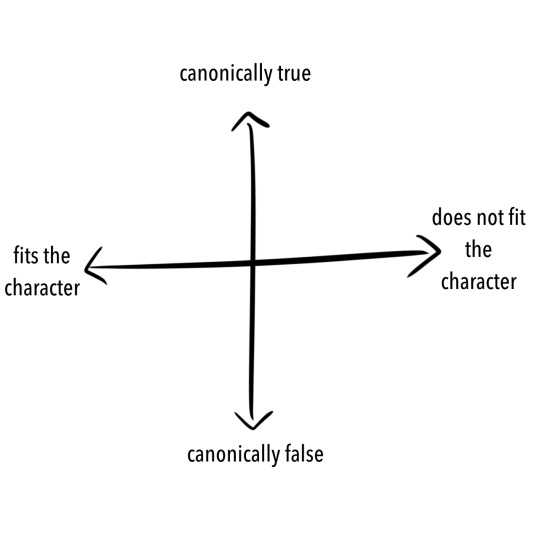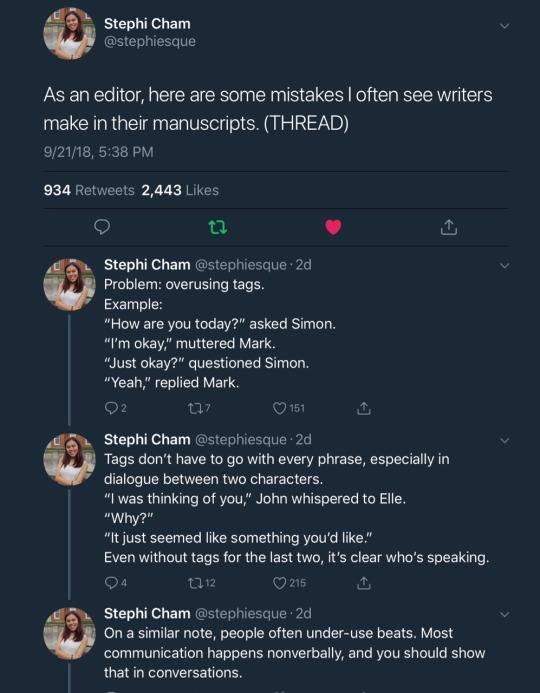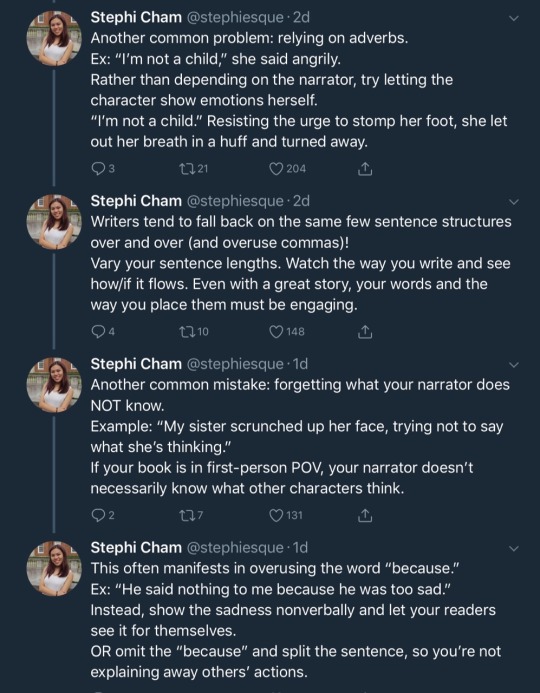Text
i love you, Two Catfish as Street Musicians in the Kashina district, ca 1855 of an unidentified artist, you go so hard

25K notes
·
View notes
Text
You gotta write for funsies sometimes. Everything doesn’t have to be groundbreaking. Like. Who cares if it’s a little silly it is made out of love
77K notes
·
View notes
Text
Writing Advice: How to Create Conflict when Your Characters are Competent.
Featuring Leverage, the ultimate in Competency Porn.
Make them so good it gets them in trouble. So you've got a hacker and he's the best, definitively. Okay, well, one of his fake IDs just got called for jury duty. You pretended to be a psychic so well, someone kidnapped you to talk to a dead crime lord.
Make them targets. You're so good, enemies you didn't even know about are trying to kill you just so they won't have to take you on in your element. You're being blackmailed into doing a thing because you're the only one that can.
Limit the scope of competency. Sure, you're competent as a fighter, but your hacker is in jail and now you have to do his job and you are not competent in that. Yeah, you can climb a building, but do you know what you need to do to not end up in a crevasse while climbing a mountain?
Raise the stakes. Can you handle extracting a orphan being used by a washed up actress to fund her extravagant lifestyle? Yes. But can you handle extracting 30 orphans being used by the Slovenian mob to fund gunrunning? Maybe all you wanted was to get enough money to buy back a house, but instead you have to ruin the company so that all houses they illegally obtained are returned to their rightful owners.
Make others competent, too. Your characters are the best, but are they the best of the best? If you take you enemy down, do you go, too? If you win, does it make them win? Does it get out of hand and make other people start noticing when you're trying to keep your head down? Do they know every trick in the book and know the next move before you make it?
Make others painfully incompetent. Your characters are the best, but are they woefully unprepared for people who are not even good? Can your hologram hacker roll with it when the vital information is on a casset tape? Is the old mentor up to date on the recent technology, or is he going to screw you because he assumes the cops are just as corrupt/incompetent as when he was young?
Have some standards. Specifically, morals that make it impossible for your characters to back out or gets them in trouble for doing things "off-script." You can't leave on the train someone just stole for you because you've got to go back and stop the bad guys from bombing the IRS (even if we don't like them). You wish you could just say no to that assassin contract and leave, but someone's getting assassinated and you have to stop it because you're a good guy.
Bring up the past. Do you think that bad guy you brutally scarred a decade ago is going to carry a grudge? Do you have to save your ex-wife from the bad guy, who may also be her boyfriend, and if you suggest that she'll shut you out and you won't be able to save her or get paid? It's Draaamaaaa, babee.
22K notes
·
View notes
Text
i call this the headcanon chart. see my vision

63K notes
·
View notes
Text
A Guide to Historically Accurate Regency-Era Names

I recently received a message from a historical romance writer asking if I knew any good resources for finding historically accurate Regency-era names for their characters.
Not knowing any off the top of my head, I dug around online a bit and found there really isn’t much out there. The vast majority of search results were Buzzfeed-style listicles which range from accurate-adjacent to really, really, really bad.
I did find a few blog posts with fairly decent name lists, but noticed that even these have very little indication as to each name’s relative popularity as those statistical breakdowns really don't exist.
I began writing up a response with this information, but then I (being a research addict who was currently snowed in after a blizzard) thought hey - if there aren’t any good resources out there why not make one myself?
As I lacked any compiled data to work from, I had to do my own data wrangling on this project. Due to this fact, I limited the scope to what I thought would be the most useful for writers who focus on this era, namely - people of a marriageable age living in the wealthiest areas of London.
So with this in mind - I went through period records and compiled the names of 25,000 couples who were married in the City of Westminster (which includes Mayfair, St. James and Hyde Park) between 1804 to 1821.
So let’s see what all that data tells us…
To begin - I think it’s hard for us in the modern world with our wide and varied abundance of first names to conceive of just how POPULAR popular names of the past were.
If you were to take a modern sample of 25-year-old (born in 1998) American women, the most common name would be Emily with 1.35% of the total population. If you were to add the next four most popular names (Hannah, Samantha, Sarah and Ashley) these top five names would bring you to 5.5% of the total population. (source: Social Security Administration)
If you were to do the same survey in Regency London - the most common name would be Mary with 19.2% of the population. Add the next four most popular names (Elizabeth, Ann, Sarah and Jane) and with just 5 names you would have covered 62% of all women.
To hit 62% of the population in the modern survey it would take the top 400 names.
The top five Regency men’s names (John, William, Thomas, James and George) have nearly identical statistics as the women’s names.
I struggled for the better part of a week with how to present my findings, as a big list in alphabetical order really fails to get across the popularity factor and also isn’t the most tumblr-compatible format. And then my YouTube homepage recommended a random video of someone ranking all the books they’d read last year - and so I present…
The Regency Name Popularity Tier List
The Tiers
S+ - 10% of the population or greater. There is no modern equivalent to this level of popularity. 52% of the population had one of these 7 names.
S - 2-10%. There is still no modern equivalent to this level of popularity. Names in this percentage range in the past have included Mary and William in the 1880s and Jennifer in the late 1970s (topped out at 4%).
A - 1-2%. The top five modern names usually fall in this range. Kids with these names would probably include their last initial in class to avoid confusion. (1998 examples: Emily, Sarah, Ashley, Michael, Christopher, Brandon.)
B - .3-1%. Very common names. Would fall in the top 50 modern names. You would most likely know at least 1 person with these names. (1998 examples: Jessica, Megan, Allison, Justin, Ryan, Eric)
C - .17-.3%. Common names. Would fall in the modern top 100. You would probably know someone with these names, or at least know of them. (1998 examples: Chloe, Grace, Vanessa, Sean, Spencer, Seth)
D - .06-.17%. Less common names. In the modern top 250. You may not personally know someone with these names, but you’re aware of them. (1998 examples: Faith, Cassidy, Summer, Griffin, Dustin, Colby)
E - .02-.06%. Uncommon names. You’re aware these are names, but they are not common. Unusual enough they may be remarked upon. (1998 examples: Calista, Skye, Precious, Fabian, Justice, Lorenzo)
F - .01-.02%. Rare names. You may have heard of these names, but you probably don’t know anyone with one. Extremely unusual, and would likely be remarked upon. (1998 examples: Emerald, Lourdes, Serenity, Dario, Tavian, Adonis)
G - Very rare names. There are only a handful of people with these names in the entire country. You’ve never met anyone with this name.
H - Virtually non-existent. Names that theoretically could have existed in the Regency period (their original source pre-dates the early 19th century) but I found fewer than five (and often no) period examples of them being used in Regency England. (Example names taken from romance novels and online Regency name lists.)
Just to once again reinforce how POPULAR popular names were before we get to the tier lists - statistically, in a ballroom of 100 people in Regency London: 80 would have names from tiers S+/S. An additional 15 people would have names from tiers A/B and C. 4 of the remaining 5 would have names from D/E. Only one would have a name from below tier E.
Women's Names
S+ Mary, Elizabeth, Ann, Sarah
S - Jane, Mary Ann+, Hannah, Susannah, Margaret, Catherine, Martha, Charlotte, Maria
A - Frances, Harriet, Sophia, Eleanor, Rebecca
B - Alice, Amelia, Bridget~, Caroline, Eliza, Esther, Isabella, Louisa, Lucy, Lydia, Phoebe, Rachel, Susan
C - Ellen, Fanny*, Grace, Henrietta, Hester, Jemima, Matilda, Priscilla
D - Abigail, Agnes, Amy, Augusta, Barbara, Betsy*, Betty*, Cecilia, Christiana, Clarissa, Deborah, Diana, Dinah, Dorothy, Emily, Emma, Georgiana, Helen, Janet^, Joanna, Johanna, Judith, Julia, Kezia, Kitty*, Letitia, Nancy*, Ruth, Winifred>
E - Arabella, Celia, Charity, Clara, Cordelia, Dorcas, Eve, Georgina, Honor, Honora, Jennet^, Jessie*^, Joan, Joyce, Juliana, Juliet, Lavinia, Leah, Margery, Marian, Marianne, Marie, Mercy, Miriam, Naomi, Patience, Penelope, Philadelphia, Phillis, Prudence, Rhoda, Rosanna, Rose, Rosetta, Rosina, Sabina, Selina, Sylvia, Theodosia, Theresa
F - (selected) Alicia, Bethia, Euphemia, Frederica, Helena, Leonora, Mariana, Millicent, Mirah, Olivia, Philippa, Rosamund, Sybella, Tabitha, Temperance, Theophila, Thomasin, Tryphena, Ursula, Virtue, Wilhelmina
G - (selected) Adelaide, Alethia, Angelina, Cassandra, Cherry, Constance, Delilah, Dorinda, Drusilla, Eva, Happy, Jessica, Josephine, Laura, Minerva, Octavia, Parthenia, Theodora, Violet, Zipporah
H - Alberta, Alexandra, Amber, Ashley, Calliope, Calpurnia, Chloe, Cressida, Cynthia, Daisy, Daphne, Elaine, Eloise, Estella, Lilian, Lilias, Francesca, Gabriella, Genevieve, Gwendoline, Hermione, Hyacinth, Inez, Iris, Kathleen, Madeline, Maude, Melody, Portia, Seabright, Seraphina, Sienna, Verity
Men's Names
S+ John, William, Thomas
S - James, George, Joseph, Richard, Robert, Charles, Henry, Edward, Samuel
A - Benjamin, (Mother’s/Grandmother’s maiden name used as first name)#
B - Alexander^, Andrew, Daniel, David>, Edmund, Francis, Frederick, Isaac, Matthew, Michael, Patrick~, Peter, Philip, Stephen, Timothy
C - Abraham, Anthony, Christopher, Hugh>, Jeremiah, Jonathan, Nathaniel, Walter
D - Adam, Arthur, Bartholomew, Cornelius, Dennis, Evan>, Jacob, Job, Josiah, Joshua, Lawrence, Lewis, Luke, Mark, Martin, Moses, Nicholas, Owen>, Paul, Ralph, Simon
E - Aaron, Alfred, Allen, Ambrose, Amos, Archibald, Augustin, Augustus, Barnard, Barney, Bernard, Bryan, Caleb, Christian, Clement, Colin, Duncan^, Ebenezer, Edwin, Emanuel, Felix, Gabriel, Gerard, Gilbert, Giles, Griffith, Harry*, Herbert, Humphrey, Israel, Jabez, Jesse, Joel, Jonas, Lancelot, Matthias, Maurice, Miles, Oliver, Rees, Reuben, Roger, Rowland, Solomon, Theophilus, Valentine, Zachariah
F - (selected) Abel, Barnabus, Benedict, Connor, Elijah, Ernest, Gideon, Godfrey, Gregory, Hector, Horace, Horatio, Isaiah, Jasper, Levi, Marmaduke, Noah, Percival, Shadrach, Vincent
G - (selected) Albion, Darius, Christmas, Cleophas, Enoch, Ethelbert, Gavin, Griffin, Hercules, Hugo, Innocent, Justin, Maximilian, Methuselah, Peregrine, Phineas, Roland, Sebastian, Sylvester, Theodore, Titus, Zephaniah
H - Albinus, Americus, Cassian, Dominic, Eric, Milo, Rollo, Trevor, Tristan, Waldo, Xavier
# Men were sometimes given a family surname (most often their mother's or grandmother's maiden name) as their first name - the most famous example of this being Fitzwilliam Darcy. If you were to combine all surname-based first names as a single 'name' this is where the practice would rank.
*Rank as a given name, not a nickname
+If you count Mary Ann as a separate name from Mary - Mary would remain in S+ even without the Mary Anns included
~Primarily used by people of Irish descent
^Primarily used by people of Scottish descent
>Primarily used by people of Welsh descent
I was going to continue on and write about why Regency-era first names were so uniform, discuss historically accurate surnames, nicknames, and include a little guide to finding 'unique' names that are still historically accurate - but this post is already very, very long, so that will have to wait for a later date.
If anyone has any questions/comments/clarifications in the meantime feel free to message me.
Methodology notes: All data is from marriage records covering six parishes in the City of Westminster between 1804 and 1821. The total sample size was 50,950 individuals.
I chose marriage records rather than births/baptisms as I wanted to focus on individuals who were adults during the Regency era rather than newborns. I think many people make the mistake when researching historical names by using baby name data for the year their story takes place rather than 20 to 30 years prior, and I wanted to avoid that. If you are writing a story that takes place in 1930 you don’t want to research the top names for 1930, you need to be looking at 1910 or earlier if you are naming adult characters.
I combined (for my own sanity) names that are pronounced identically but have minor spelling differences: i.e. the data for Catherine also includes Catharines and Katherines, Susannah includes Susannas, Phoebe includes Phebes, etc.
The compound 'Mother's/Grandmother's maiden name used as first name' designation is an educated guesstimate based on what I recognized as known surnames, as I do not hate myself enough to go through 25,000+ individuals and confirm their mother's maiden names. So if the tally includes any individuals who just happened to be named Fitzroy/Hastings/Townsend/etc. because their parents liked the sound of it and not due to any familial relations - my bad.
I did a small comparative survey of 5,000 individuals in several rural communities in Rutland and Staffordshire (chosen because they had the cleanest data I could find and I was lazy) to see if there were any significant differences between urban and rural naming practices and found the results to be very similar. The most noticeable difference I observed was that the S+ tier names were even MORE popular in rural areas than in London. In Rutland between 1810 and 1820 Elizabeths comprised 21.4% of all brides vs. 15.3% in the London survey. All other S+ names also saw increases of between 1% and 6%. I also observed that the rural communities I surveyed saw a small, but noticeable and fairly consistent, increase in the use of names with Biblical origins.
Sources of the records I used for my survey:
Ancestry.com. England & Wales Marriages, 1538-1988 [database on-line].
Ancestry.com. Westminster, London, England, Church of England Marriages and Banns, 1754-1935 [database on-line].
11K notes
·
View notes
Text

This tattoo is very funny when you know that kerning is the fancy term for the space between letters. Very important in text design to get it right.
22K notes
·
View notes
Text
Keep seeing that post where OP starts like 'Thinking about...grieving the undead' and then adds on about like. Real life situations where people have not died but have left your life and you would have reason to grieve them.
All respect, that's an important concept, but that is not what I am thinking about when I read 'grieving the undead'.
44K notes
·
View notes
Text
I know adverbs are controversial, but "said softly" means something different than "whispered" and this is the hill I will die on.
35K notes
·
View notes
Text
Bad idea: Age gap discourse but in a fantasy land where there's multiple races who have vastly different lifespans and life styles.
Is it wrong for a 27 year old human to date a 140 year old stone elf, considering most stone elves don't get out of diapers till their 30s?
Is it wrong for a 80 year old dwarf to date a two year old fire wisp, when fire wisps only live up to 5 years (between the eruptions) and have memories of their past lives, so in a way they're "born" at age 400,000+? That octogenarian dwarf is way younger than the fire wisp that's only physically younger than some of the socks the dwarf has!
Is it wrong for a chronomancer who was never born to date, well, anyone? They are zero years old and infinity years old and negative one hundred and seventeen years old all at once. They look like an old human, sure, with the long white beard and the wrinkly skin, but as far as anyone can tell, they've always looked like that. We've seen the cave paintings.
Is it wrong for a 30 year old lizardman (that's old in lizardman years) to date a human who is 60 years old in biological years (because of aging spells), 26 years old in lived-experience years, but only 13 years old in calendar years? (ie, they were born 13 years ago, but spent some of that time in sideways timelines, so they've lived more years than have passed in their home timeline?)
Is it wrong for a 12,000 year old dragon date a pile of 400 kobolds when kobolds only live like 10 years on average, but reach full maturity in one year? And if you disagree, can you do anything about it? You do know what happened to the last policeman who tried to arrest a dragon, right? Their city is still smoldering, 50 years later.
Is it wrong for anyone to date the time worm? It's the same age, every year. So the age gap can only intensify. If you start dating the time worm when you're both the same age, when do you break it off because you've become too much older than them?
And most confusing of all... What about the fairies? They could be anything between a thousand and a day old, they would lie about their age either way, and they can look like whatever they want. There's fairies we know for a fact have been around since the founding of The City of Towers, who met the silent mother herself, and also look like they're at most ten years old. Is it wrong to date them, or just really uncomfortable for everyone who sees it? And on the other side there's fairies who are "born" (hatched? They come from plants, I'm not sure what the verb even would be. Seeded? Sprouted, maybe) this week who are already appearing like middle-aged men and dancing with widows in what looks like a scheme to run off with her fortune but they never take the money, because what would a fairy want with worthless metal discs? Maybe fairies have a hive mind or genetic memory or reincarnation with full memories, they'd never tell you or give you a straight (or consistent) answer anyway.
Stone golems are really the only inter-race dating situation anyone can agree on. They're unthinking & unmoving solid rock during the day, so those hours don't count. Thus their "real age" is a nice even half of their true age. So if you meet a stone golem who was dug out 30 years ago, watch out: that's a 15 year old, and if you're a 25 year human, that's too young for you, even though their dig-date is five years before your birth-date.
18K notes
·
View notes
Text
fanfiction writers when a character is remotely non-human

12K notes
·
View notes
Text


Abandoned Tori Gate found in Japanese Tunnel
Such gates are used to mark the entrance to sacred grounds or gods' territories. "The tori gate symbolizes the division between the sacred and the profane, and is considered a spiritual gateway between the physical world and the spiritual realm."
40K notes
·
View notes
Text



Forest afternoon's light.
Hokkaido, Japan.
13K notes
·
View notes






